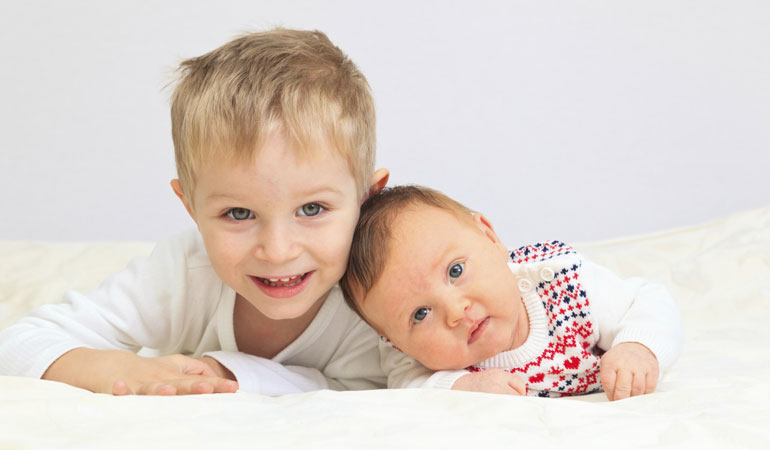A few months after I officially became a mom, I knew I wanted to ride that roller coaster again — the mountains of paperwork, the lull of the wait, and that breathtaking moment when I finally saw my daughter Katie’s face. It took another year before my husband, Mike, was fully on board. And, at that point, I thought the biggest decisions were behind us.
But, as it turns out, adopting a second child raises all sorts of questions that didn’t arise the first time around. How important is it to adopt a child who has a similar background to your first child? Should your first tag along when you travel to bring home your newest family member?
Like so many other adoptive parents, we spent a lot of time researching, debating, and discussing before we reached the decisions that felt right. If you’re just starting out, here’s some food for thought (and fuel for your debates).
Which path should we take?
At first, this seemed like a no-brainer: We were thrilled with our experience of adopting from China the first time, and had embraced Chinese culture since Katie arrived home. So we signed up for a second go-round from the same country.
But as soon as we handed in our dossier, we began to question our decision — the timelines had increased exponentially, pushing our projected wait into four- and five-year territory. So we began to explore other options, and to rethink the importance of our children coming from the same culture.
Overwhelmingly, parents who adopt a second time want their children to share a heritage and a birth story. But experts say that that may be less important than you think. “Some people believe both children will benefit by having someone else who looks like them in the family, but I think that’s just guesswork,” says Joni Mantell, director of the Infertility and Adoption Counseling Center. “Every child is an individual.” Children should be wanted for themselves, not for what they bring to a sibling.
Because adoptive families tend to honor their children’s cultures, choosing the same path for a second child would make things easier. “It takes a great deal of energy to honor the holidays and language and racial heritage and traditions of a birth country,” says Fran Eisenman, an adoptive mom and clinical social worker, based in Massachusetts. “Parents need to determine whether they have the energy to do justice to more than one culture, and if they will have the funds to visit more than one birth country in the future.”
What works best for your family? “We were certain that we wanted to go the same route we took the first time around,” says Eisenman. “Our adoption experience had been positive, and we had developed ties to Colombia after spending several months there. We wanted our children to share a heritage and a history, and a country of birth to explore together in the future. Years later, I still believe the common factors are pluses for our girls, but they are by no means necessary. Had an opportunity come our way from another avenue, I’m sure our children would have been fine.”
After soul-searching, and exploring other options, Mike and I decided to stay the course with China, but switch to the waiting child program.
How do we prepare our child?
Many experts recommend waiting to share the news of another adoption with little ones, for whom a week can seem like an eternity. “Less is more with kids younger than five,” says Joni Mantell. “Six weeks before your travel date would give you plenty of time to talk. With a 10-year-old, I would tell him much earlier.”
But Mike and I let our three-year-old in on the news as soon as we’d made our decision — we knew we couldn’t keep a secret that big for that long (especially since she’d been running a spectacular campaign to get a sibling). One day, Katie talked about how she’d like to play with a little sister, so we jumped in: “Well, right now, we are starting to get together the letters and papers we need to ask China for a little sister or brother for you. What do you think?” Needless to say, she was thrilled. (If your child doesn’t give you a similar opportunity to share, take a look at “Paving the Way,” in the sidebar, for ways to broach the subject.)
Now, a year into the wait, we bring up the idea of her little sister or brother regularly. We’ve let her pick out a special “lovey” she can bring along to give her new sibling, and we talk about how things will change in both good (a big-girl car seat for Katie!) and not-as-good (she’ll have to share Mommy and Daddy) ways when her brother or sister comes home. And Katie mentions her sibling often, telling us that she’ll teach her to do big-girl things, and that she’ll entertain the little one. Once we’re closer to a referral, we’ll ramp up the conversations — and add a few big-sister books to our reading library.
It seems many adoptive parents make a similar choice. “By the time we traveled, Abby was well-prepared for the arrival of her sister, Lilly. We had been talking about her for nearly two years!” says Gail Baity, a mother in Timonium, Maryland. “Lilly was a familiar topic of our daily conversations with Abby, and was always in our family’s nighttime prayers.”
Involving your first child in the adoption of another — whether it’s by choosing photos to include with the dossier or birth mother letter, or by selecting a motif for the nursery — can make her feel included in the process. And it can also help her understand her own adoption story better. “In addition to some resentment about welcoming a new sibling, the new adoption may stir up feelings about her own adoption,” Mantell suggests. “Listen for that, and be ready to reassure your child that you’re her family forever.”
In domestic adoptions, in which a birth mother may change her mind after being matched with your family, you should play it safe when you explain it to your child. If your state law allows you to take the child home before the birth mother signs the papers, “I advise parents to tell their child that they will be babysitting for a few days or weeks, until the baby’s birth mother decides whether she can parent, or whether adoption is a better plan. If adoption is better, your family will be the child’s forever family,” says Ronny Diamond, director of the Adoption Counseling Team of Spence-Chapin Services in New York City. “This can be difficult for families, who are eager to welcome the newest family member, but waiting means that, when the wait is over, the family can really celebrate.”
As news of your impending arrival begins to hit your social network, prepare your child for the inevitable questions. “The new adoption puts your kid in a slightly educational role,” Mantell says. “Help him out by discussing the questions that might come his way, and how to answer them.”
How should we share the news with family and friends?
Our families were thrilled about our first adoption, so we were shocked by a few lukewarm responses to our decision to adopt again. Some people worried that, since we got the “perfect” child the first time around, we were tempting fate with a second. Fortunately, the preparation we’d made for the first adoption helped us deal with less positive responses.
“Most adoptive parents have already weathered some unexpected reactions — the family members who suggest that you try more fertility treatments, or the friends who doubt your ability to love an adopted child,” says Eisenman. “By the time the second adoption plan comes along, parents should have a repertoire of statements to make to those who are unsupportive. ‘Everyone builds a family in their own way, and this is the way we choose.’ ‘We would never presume to question you about your family choices.’”
Since you’ve shared such news once before, you probably know who would create anxiety for you — the aunt who calls every day for updates, for example — and might choose not to tell them immediately. “Cherry-pick whom you tell, and when,” says Mantell.
One big caveat: You should let your child know about your decision to adopt before you tell other family members. Otherwise, you risk having your child hear the news from someone who spills the beans. “I wouldn’t tell the grandmothers of a seven-year-old before you tell the child,” Mantell says. “They could just blurt it out.”
How should we handle travel?
Yes, it’d be simpler (and a lot cheaper) to leave Katie home when we finally travel for her sister or brother. But we felt that it was important for her to travel back to her homeland and to be there to welcome the newest family member — and we hope that watching Katie embrace us will help our new child to warm up to us a little faster.
But we are taking a bit of advice from Mantell: “If you’re traveling with your child, bring along someone else to help out — a friend, Grandma or Grandpa. You need to be focused on what’s happening.” My brother will be tagging along to serve as luggage sherpa, cinematographer, and child wrangler, helping our daughter navigate the buffet lines and taking care of her while we do the paperwork.
There are several factors that affect your decision to travel solo or with the family — your budget, your child’s age and adaptability, the availability of care at home, school obligations, and any concern for your child’s health or safety while traveling abroad.
“We felt that it was important to maintain our six-year-old’s routine,” says Stacy Sinibaldi, an adoptive mom in Plaistow, New Hampshire. “And so we decided that he would stay home, with family, and meet his sister on his own turf, without jet lag or having to cope with new surroundings. One of my most precious memories is of our son coming down for breakfast and seeing his sister for the first time, after we’d gotten in at 2 a.m. He smiled the most blissful smile and said, ‘My baby’s here.’”





